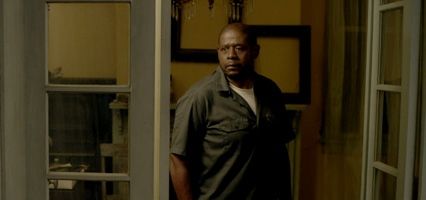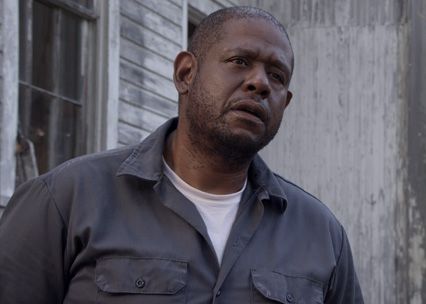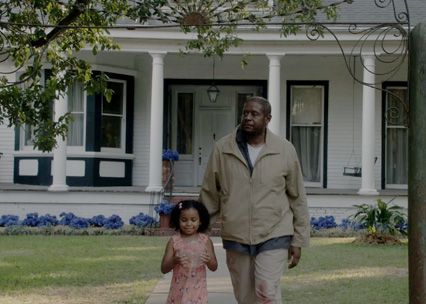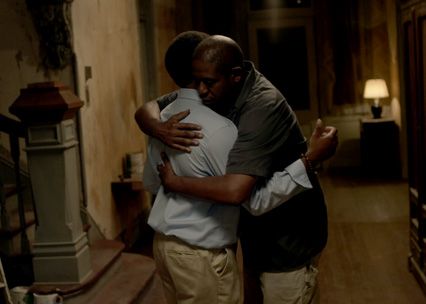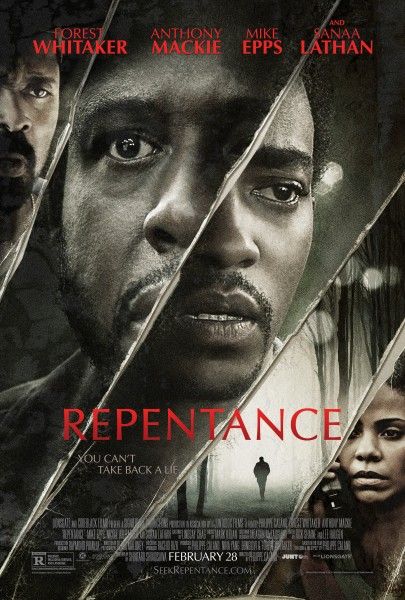Forest Whitaker plays a profoundly troubled man struggling to hold onto his sanity and do the right thing in director Philippe Caland’s intriguing horror-thriller, Repentance. Years after a drunken car crash that almost took his life, Tommy Carter (Anthony Mackie) has reinvented himself as a therapist and spiritual advisor. His successful book release draws the attention of Angel Sanchez (Whitaker) who convinces Carter to take him on as a personal client. Opening February 28th, the film also stars Mike Epps, Sanaa Lathan, Nicole Ari Parker and Ariana Neal.
We recently landed an exclusive interview with Whitaker who revealed how the project grew out of a small film Caland had previously made, what it was like acting opposite Mackie in some very intense scenes, why he loves shooting on location in New Orleans, what he looks for in a project, how he stays true to his acting roots, why it’s important to find a connection with the characters he plays, his thoughts on the evolution of African American films and why content is increasingly reflecting the diversity in material that’s being produced, and his upcoming projects: the lead role in Two Men in Town and plans to direct The Shack. Check out the interview after the jump.
QUESTION: We’ve seen quite a number of films with African American leads recently where it’s a universal story that doesn’t feel exclusionary to any demographic. More and more the content seems to reflect the diversity in the material that’s being produced. Can you comment on that evolution in Hollywood?
FOREST WHITAKER: I think there are two things. One is there is a financial equation that’s surrounding it because they’ve started to see that these films are very lucrative, particularly if they’re made for a certain price bracket. So, the studios are making them. Then you move into another phase in independent filmmaking where people are raising their money more independently than before because the studios aren’t making certain types of character-driven films. People are recognizing that because of the stats that this is an area that they can really explore, and artists are going out and finding it. Then I think there’s another area, which is the fact that society itself is trying to evolve. As it’s evolving, we’re starting to see people moving towards social good, moving towards inclusion, moving towards understanding, and seeing that these stories are part of their own stories, which is what is trying to be said. I think they are embracing that in a way that maybe they didn’t have the ability to even embrace before because those stories weren’t being made. And now, we’re seeing that these stories are crossing over to different people, and they’re making their mark, in a sense, on the heart.
Can you talk about how this particular project came together for you?
WHITAKER: Initially, Philippe Caland, the director, is a friend and actually a partner in one of my companies, Juntobox Films, and he had done this film. It was a small independent which he had done, and I had done a small independent movie before. He showed me a movie called The Guru & The Gypsy, and I thought it had a lot of potential to make a really great film. I talked to him about broadening it and transferring, and then we decided to remake the film and make it in a larger way. I was able with Philippe’s blessings to get one of the writers from my TV show, Shintaro Shimosawa, to write it and reach out when the decision was made to make this film a little differently and to add the artists, and it all fell into place.
What does a story have to say to you for you to invest your time and effort into it? What do you look for in a project?
WHITAKER: In every project, I always look for the depth of humanity inside of it. I’m just trying to say if we can help in some way heal the equation with what’s going on with us as people. I look at that here. I think this movie deals a lot with healing. It deals with dealing with your past, of having to confront issues that you may have buried before, and once you’re able to open them up and find the truth, whether that allows you to move forward in life. So, for me, I do look at that thematic of healing of humanity.
You have some very intense scenes with Anthony Mackie in this film. How did you calibrate your performance as your character shifts and evolves?
WHITAKER: In the beginning, he’s in control and he’s controlling, and then ultimately, I take away his control and force him to confront. We just kind of committed, because Anthony had a hard task of being tied up, beat up, watered over, yelled at, (laughs) and we trusted each other. I think that’s the big key, that we were able to say, “Okay. We’re going to do this. We’re going to commit completely to this.” We knew that we were going to be there for each other in those scenes because they were emotionally and physically violent at times.
Every project has its challenges. What were some of the unique challenges you encountered either acting in or producing this?
WHITAKER: Whenever you’re playing someone with such repressed hate, the acting challenges are always how to convey that, how to measure it so that it’s not overwhelming, but to be true to the person. We were fortunate because I mentioned Philippe is my partner in Juntobox, but our other partner, Rashid Rizk, financed the film. He put all the money up for the film. It’s a unique experience when you’re doing an independent film where you have one person who puts up all the funds to make the film. And then, there were just the logistic parts of it. I think Philippe had done such free-flowing films. The first movie we did was totally improvisational. There was no script. And so, to be able to help him adjust to a more structured environment and to try to make sure that he was getting what he wanted inside of the structured environment was a task for me as a producer.
You’ve been involved in some very cool and iconic films in your career and I’m wondering what you have coming up either in development or about to be released in theaters that you’re excited for audiences to see?
WHITAKER: Well, tomorrow I leave for Berlin for a movie I did called Two Men in Town. It’s [directed by] another filmmaker called Rachid Bouchareb. It’s a remake of a French film with Alain Delon, and I play a character, a guy who’s in prison and converts to Islam. He’s in a border state in New Mexico and he’s released, and now the pressures of whether he’s a terrorist and all these things are pushed upon him. I think Rachid did something really special with that film. Also, I believe I’ll be directing a film this year. I haven’t directed in a while. It’s called The Shack which is based on a book that deals with healing, too.
Can you talk a little about shooting in New Orleans and what that experience was like?
WHITAKER: I love shooting there. I’ve shot so many movies there for so many years. The first time was when North and South was shot there and I was a kid. I was in my early twenties. And then there’s this one. So, I’ve grown to love the place, and I think the first few times I had ever been there, I tried to buy a house there. I wanted to live there because I liked the place so much. It’s a great community. They have an amazing film community so you get these amazing crews that come in to work that are local. Everybody is totally invested. And now, at this point, I have relationships with a lot of people because I’ve been doing it for decades there.
How do you stay true to your acting roots in the personal projects that you choose?
WHITAKER: I stay true, because whatever the project is, I’m still looking for inside of that character. It’s the thing that connects him to me and to everybody else. So, the search is the same. It’s to unveil the truth, and that’s how I stay true, because my purpose isn’t altered.

